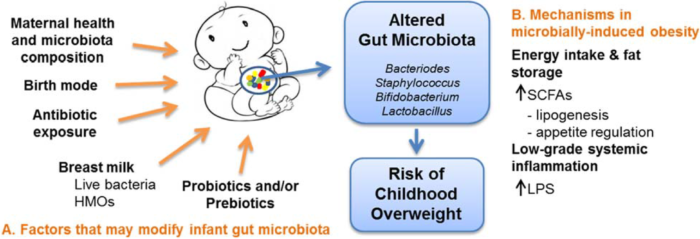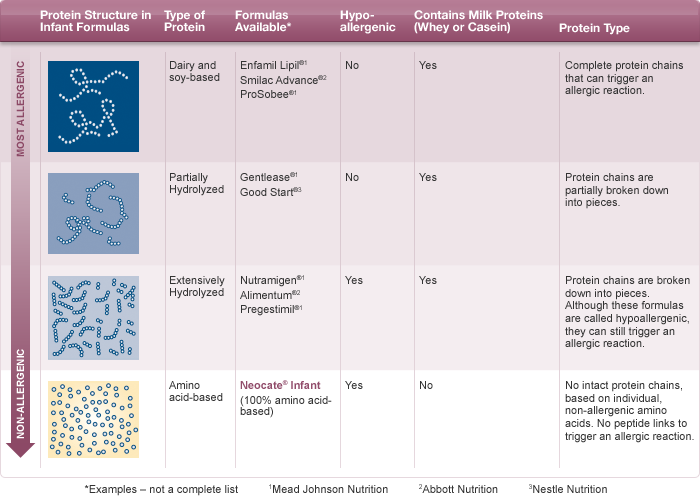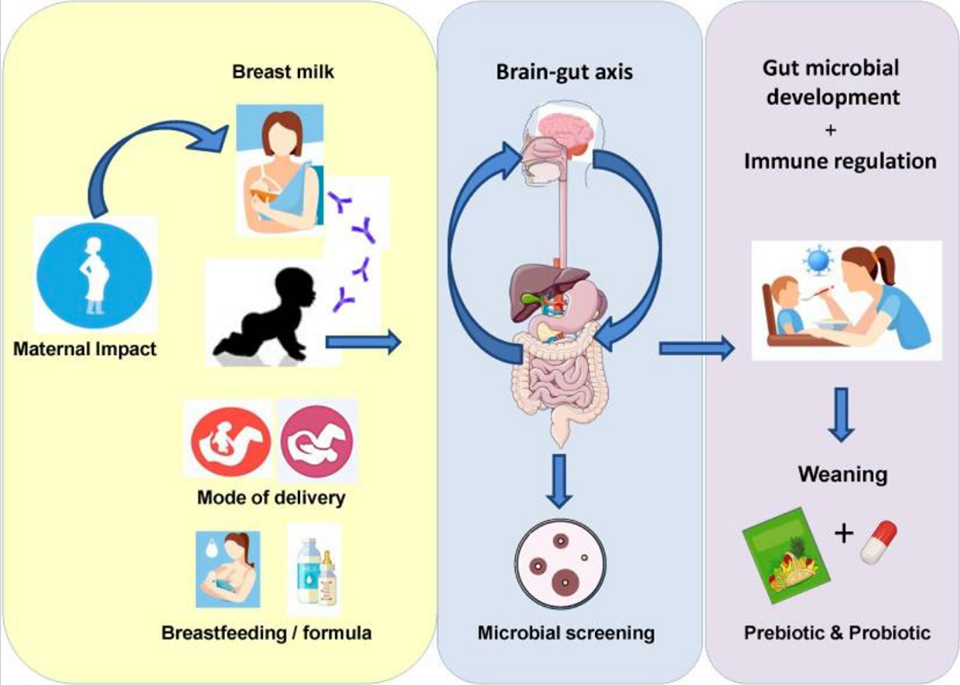The significance of gut health in infants cannot be overstated, as it has a monumental impact on their overall development. Due to the still-developing digestive system of an infant, it is critical to ensure that they receive adequate nutrients. In cases where breast milk may not be available, baby formula can serve as a viable source of these essential nutrients.

With numerous types of baby formulas readily accessible in today’s market, each having its own unique set of advantages and disadvantages, selecting the best one for your little one necessitates careful consideration. Allergies or intolerances should be taken into account when making this decision, as well as any special dietary needs that your child may have.
Probiotics and prebiotics are gaining popularity in baby formulas due to their potential benefits for gut health. Probiotics are live bacteria that help maintain a healthy balance of microorganisms in the gut while prebiotics act as food for these beneficial bacteria. However, before incorporating probiotics or prebiotics into your infant’s diet through formula or other supplements like drops or powders – you must seek advice from your pediatrician first.
All in all, comprehending how probiotics and prebiotics function within baby formulas can assist parents in making informed decisions about what they feed their little ones. By being aware of the benefits and possible risks associated with these ingredients alongside the various kinds of formulas available on today’s market – you can make choices that will support your child’s optimal growth and development from infancy until adulthood without jeopardizing their well-being at any stage during this journey!
Different Types of Formulas Available for Infants
The most optimal option for feeding your infant is undoubtedly breastmilk. However, due to a variety of reasons, some parents may need or prefer using infant formula instead. The market today offers an array of infant formulas ranging from cow’s milk-based formula to soy-based formula and hypoallergenic formula.

Cow’s milk-based formula seems to be the go-to choice for most parents as it has been modified in composition to resemble the properties of breastmilk closely. Soy-based formulas serve as an alternative for infants who cannot bear with cow’s milk protein or lactose. Hypoallergenic formulas are specially created to cater specifically to babies with allergies or sensitivities and could contain partially hydrolyzed proteins or amino acids.
In recent times, there has been a surge in interest regarding prebiotics and probiotics being included as additives in baby formulas because of their potential benefits towards gut health. Prebiotics are non-digestible carbohydrates that stimulate good bacteria growth in the gut while probiotics consist of live microorganisms that assist in maintaining healthy gut bacteria balance. Research studies suggest that these additives might also aid eczema symptom reduction.
When deciding which type of baby formula suits your little one best, always consult with your pediatrician beforehand before making any decisions since they can provide essential guidance based on your child’s unique needs and circumstances.
Choosing the Best Baby Formula for Your Little One
When it comes to selecting the optimal infant formula for your precious little one, navigating through the plethora of options can be a perplexing task. Although breast milk is deemed as the gold standard, it may not always be feasible or pragmatic. This is where infant formula comes into play, providing a viable alternative.
One pivotal aspect to take into account when picking an infant formula is whether it includes prebiotics and probiotics. These friendly bacteria are essential in promoting gut health and facilitating digestion in babies. While breast milk naturally contains these beneficial microbes, some formulas also integrate them to emulate the advantages of human milk.
It’s crucial to bear in mind that while formula-fed infants can still thrive and flourish normally, they may encounter different bowel movements compared to their exclusively breastfed counterparts. Formula-fed babies may also suffer from heightened colic or eczema symptoms than those who solely rely on breastfeeding for nourishment. Consulting with a pediatrician can aid in determining which type of formula would cater best to your little one’s specific needs during their transition from either breastmilk or solid foods into regular usage of infant formula without any untoward effects on their digestive health due to lack of live bacteria present in this meal replacement substitute relative to mother’s milk which encompasses all vital nutrients demanded by infants at an early stage of life .
Benefits of Probiotics and Prebiotics for Infants
The selection of the best baby formula is a perplexing task when it comes to infant feeding. Your little one’s health depends on this crucial decision, and therefore, careful consideration must be given to probiotics and prebiotics inclusion in the formula. Probiotics are live bacteria that balance gut bacteria, while prebiotics are a fiber type that feeds good bacteria. An amalgamation of both can significantly benefit infants as it supports their developing immune systems.
Human milk oligosaccharide (HMO) is an enigmatic form of prebiotic found only in breast milk with no replication possible in formulas; however, some brands may include similar compounds for added benefits. HMO promotes healthy gut bacteria and improves digestion in infants. Nevertheless, if you opt for a formula without HMO or its counterparts, adding baby probiotic drops can supply additional advantages.
Understanding the significance of probiotics in baby formulas is essential since they aid your child’s gut health – which plays a vital role in overall well-being and healthiness. A robust digestive system ensures better nutrient absorption with reduced risks of digestive issues such as diarrhea or constipation. Before deciding on incorporating added probiotics into your child’s diet regimen or selecting them separately within your preferred formula brand, consult with your pediatrician first to ensure safety regarding specific needs catered towards your little one’s requirements.
How Probiotics and Prebiotics Can Help Support Your Baby’s Gut Health
The enigmatic world of probiotics for infants is riddled with an abundance of bewildering benefits that will leave your mind reeling. For those nursing their precious newborns, these microbial wonders can alleviate the discomfort and woe associated with fussiness and constipation. But what if your little one was delivered via C-section or has been exposed to antibiotics? Fear not, dear parent, for a probiotic supplement may provide solace by refurbishing their gut microbiome.
What about formula-fed babies, you ask? Well, there are multitudinous types available on the market that include both prebiotics and probiotics in varying degrees. Certain European formulas are already equipped with this power duo as standard fare while American counterparts offer specific options for those babes grappling with cow’s milk allergies or requiring hypoallergenic sustenance.
It must be emphasized that not all formula varieties contain these beneficial bacteria. Liquid batches generally exclude them due to contamination risks during storage and handling; however, powdered mixes without added pre- and probiotics still have potential! These microorganisms can be obtained from supplemental sources to support baby’s gut health holistically. As always, consult esteemed organizations like the American Academy of Pediatrics alongside your pediatrician when selecting optimal nourishment alternatives tailored specifically to meet baby’s needs.
What to Know About Probiotics and Prebiotics in Baby Formulas
As parents desperately search for ways to bolster their baby’s gut health, probiotics and prebiotics are gaining popularity in the realm of infant formulas. Probiotics, with their live microorganisms that can help regulate healthy bacteria balance within the stomach, coupled with prebiotics that act as a sort of nourishing fuel for these good microbes, could offer an even more significant benefit when blended together.
However, before you rush off to grab some probiotic drops or start experimenting with different formula types that include probiotics, it’s vital to understand the various strains available. Not all bacterial strains perform equally efficiently in supporting your little one’s digestive system. Additionally, keep in mind that not every child will react identically to each type of supplement or formula.
It is worth mentioning here that certain infant formulas containing both pre- and pro-biotics may provide additional advantages beyond just promoting better digestion. For instance, some newly launched products claim they can also boost brain development and immune function through this dynamic blend. Nevertheless, always err on the side of caution by consulting with your pediatrician first before tinkering around too much with how you feed your precious bundle of joy!
Probiotic Drops and Other Probiotic Options for Infants
In the perplexing realm of baby formula, parents must be well-versed in the enigmatic world of prebiotics and probiotics. These beneficial bacteria can make all the difference for a formula-fed infant’s gut health. But with so many options on offer, it can feel like being thrust into a burst of information overload.
While some formulas boast specific strains found in human milk, others are infused with differing varieties by their manufacturers. And if your little one requires additional support, there are even probiotic drops available on the market to give them that extra edge.
But before you go adding any new supplements or formulas to your baby’s diet, consult with your pediatrician first! The FDA has approved certain types that contain these microbial marvels as safe for consumption but choosing carefully based on each individual child’s needs is paramount.
If you’d rather err on the side of caution and opt for an additive-free option instead – fear not! There are plenty available without them. Ultimately what matters most is finding what works best for your tiny tot’s digestive system and overall wellbeing amidst this confounding conundrum we call parenting.
Consult Your Pediatrician: Finding the Right Formula for Your Baby’s Needs
The quest for the perfect formula for your baby can be a perplexing and daunting task, given the plethora of options available in today’s market. With varying ingredients and formulations, it can be challenging to determine which one is best suited for your child’s unique needs. But fear not, as consulting with your trusted pediatrician can provide you with invaluable guidance.
Pediatricians possess an extensive knowledge of infant nutrition and development, enabling them to recommend the ideal formula that caters specifically to your little one’s requirements. They may even suggest organic or prebiotic-infused formulas to enhance their overall health and well-being.
While breastfeeding remains the gold standard in providing natural probiotics that promote optimal gut bacteria balance, formula-fed infants may miss out on these essential benefits. However, some companies have incorporated probiotic components into their products as well. Consulting with your pediatrician about this option could prove beneficial in ensuring that your baby receives all necessary nutrients without any adverse side effects.
In summary, entrusting your pediatrician with selecting the right formula for your precious bundle of joy guarantees they receive adequate nourishment while mitigating potential risks associated with specific types of formulas. So don’t hesitate- contact them today!

